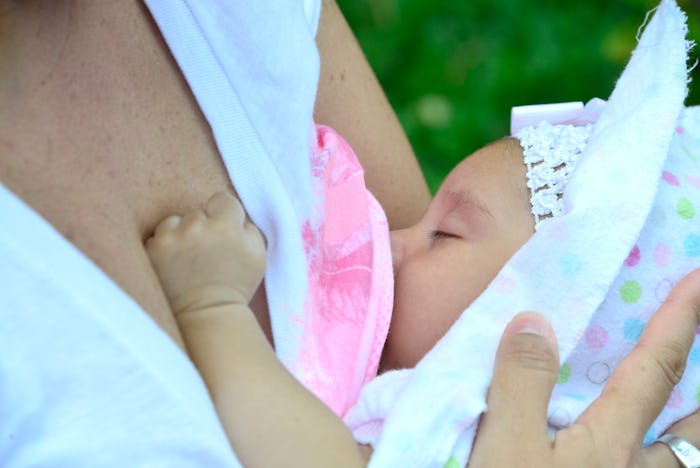Life

Breastfed Babies Might Live Longer, Healthier Lives Due To This Cool Part Of Their DNA
Breastfeeding has lots of great benefits for both mom and baby, but a new report from The American Journal of Clinical Nutrition suggests that babies who are breastfed might live longer, healthier lives than their friends who weren't, according to the New York Times. And it all comes down to a part of our DNA called telomeres.
Telomeres are these little caps wrapped around the end of each strand of our DNA (like that plastic aglet at the end of your shoelace) that protect the genes from damage and may increase our life span, according to the Proceedings of the National Academy of Sciences. As we get older, our telomeres get shorter, but some people actually have longer than average telomeres to begin with, which helps protect them from chronic diseases like diabetes, which could shorten their lives.
For a long time science wasn't sure if humans were born with their telomeres at full-length or if there was a period early in their lives when they could extend them to their maximum, most protective length.
This new study says that there does seem to be a window of time for babies when telomere length can change. And something that helps promote longer, stronger telomeres? Breastfeeding.
So how did they study this?
Researchers followed a group of babies from birth to about 5 years who were born in San Francisco to low-income mothers, all of whom were Latina and who qualified for a government food program. They measured the kids' telomere lengths and took notes about what early life factors they had been exposed to — specifically, if they were breastfed or given exclusively milk, tea, juice, or sugar water.
The study found that children who had been drinking only breastmilk for the first four to six weeks of their lives had significantly longer telomeres than babies who had been given formula only. Also interesting? The children who had been given a lot of fruit juice or soda as toddlers actually had short telomeres.
The major drawback of this study was that researchers couldn't actually tell whether breastfeeding made telomeres longer, or if babies who had longer telomeres at birth were just more likely to succeed at breastfeeding.
All the kids in the study were part of a much larger study called the Hispanic Eating and Nutrition study, which included 201 babies born in San Francisco to Latina mothers, all of whom were recruited in 2006 and 2007 while they were still pregnant. The researchers hope to find out how early eating habits and environment influence growth and the development of metabolic and/or cardiac disease over lifespan.
If those stronger, longer telomeres are the result of breastfeeding, it wouldn't really be that surprising: sciences says that breastmilk is full of anti-inflammatory compounds, which could protect telomeres and help them, in turn, do a better job of protecting a baby's genes.
But there's another, perhaps even more compelling theory: that longer telomeres are associated with a strong mother-child bond, which can certainly be forged through breastfeeding.
Children who are born into orphanages, or who experience profound neglect in their early lives and therefore lacked loving attachment, definitely have compromised telomeres. Psychological stress causes more free radicals, which causes inflammation and the release of stress hormones — all of which can hurt telomeres.
Moms who choose not to breastfeed, or who haven't gotten the hang of it yet, shouldn't worry: this is just one study of many and there are plenty of other ways you can bond with your baby and promote those healthy telomeres.